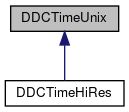#include <ddcTime.h>

Public Member Functions | |
| DDCTimeUnix () | |
| DDCTimeUnix (const time_t time_) | |
| DDCTimeUnix (const DDCTimeUnix &X) | |
| virtual | ~DDCTimeUnix () |
| void | Set () |
| void | Set (const time_t time_) |
| void | Set (const DDCTimeUnix &t) |
| time_t | Time () const |
| struct tm | CalendarTime () const |
| virtual void | DateTime (char *DateBuf, char *TimeBuf) const |
| std::string | DateStr () const |
| std::string | TimeStr () const |
| double | Elapsed (const DDCTimeUnix &t0) const |
Static Public Member Functions | |
| static DDCTimeUnix | Now () |
Public Attributes | |
| time_t | m_t |
Constructor & Destructor Documentation
◆ DDCTimeUnix() [1/3]
|
inline |
default constructor
◆ DDCTimeUnix() [2/3]
|
inline |
◆ DDCTimeUnix() [3/3]
|
inline |
copy constructor
◆ ~DDCTimeUnix()
|
inlinevirtual |
default destructor
Member Function Documentation
◆ Now()
|
inlinestatic |
constructor: current time
References Set().
Referenced by ddcLog(), and RmlGetCurrentTime().


◆ Set() [1/3]
|
inline |
set this object to current time
Referenced by DDCTimeHiRes::DDCTimeHiRes(), DDCTimeUnix(), Now(), Set(), and DDCTimeHiRes::Set().

◆ Set() [2/3]
|
inline |
assignment operator (from time_t)
◆ Set() [3/3]
|
inline |
◆ Time()
|
inline |
get low-resultion time_t time
References DateTime(), and m_t.

◆ CalendarTime()
| struct tm DDCTimeUnix::CalendarTime | ( | ) | const |
get (low-resolution) calendar time; adapted from old RmlGetCurrentTime()
Referenced by RmlGetCurrentTime().

◆ DateTime()
|
virtual |
get time and date strings in ISO-8601 format (YYYY-MM-DD HH:MM:SS) to char* buffers
- either of DateStr or TimeStr may be passed as NULL
- Parameters
-
DateBuf output buffer of at least DDCDateBufferSize bytes, or NULL TimeBuf output buffer of at least DDCTimeBufferSize bytes, or NULL
Reimplemented in DDCTimeHiRes.
References DDCDateBufferSize, and DDCTimeBufferSize.
Referenced by DateStr(), DDCTimeHiRes::DateTime(), ddcLog(), DDCTimeHiRes::Set(), Time(), and TimeStr().

◆ DateStr()
|
inline |
get date string in ISO-8601 format (YYYY-MM-DD)
References DateTime(), and DDCDateBufferSize.

◆ TimeStr()
|
inline |
get time string in 24-hour HH:MM:SS format
References DateTime(), DDCTimeBufferSize, and Elapsed().

◆ Elapsed()
| double DDCTimeUnix::Elapsed | ( | const DDCTimeUnix & | t0 | ) | const |
get elapsed time since t0, double resolution
References m_t.
Referenced by DDCTimeHiRes::Set(), and TimeStr().

Member Data Documentation
◆ m_t
| time_t DDCTimeUnix::m_t |
time value (low-resolution: 1 second)
Referenced by DDCTimeHiRes::DDCTimeHiRes(), Elapsed(), Set(), DDCTimeHiRes::Set(), Time(), and DDCTimeAvg::Time().
The documentation for this struct was generated from the following files:


 1.8.13
1.8.13